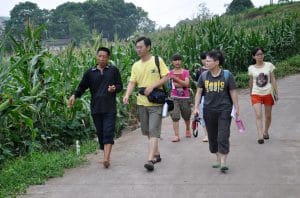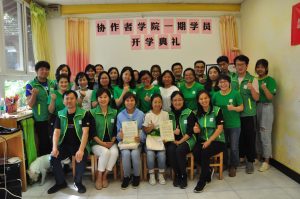This is the second part of an interview with Li Tao, founder of the Facilitators, a charity that trains migrants workers to be social workers. You can read the first part here.
In a piece of research carried out by the Facilitators on migrant workers in 2010, the key research question asked what made migrant workers happiest. To everyone’s surprise, the most popular answer did not relate to earnings, but to spending time with family members. This “money assumption” reflected how little people knew about migrant workers as a group, and the result caused Li Tao to consider a question that had always lingered in his mind: how to offer genuine help to migrants working in China’s cities.
When it comes to social work, the most ideal aid comes in the form of “empowerment”. Namely, in a given socio-material situation, social workers help their clients to realize and achieve their capabilities, strengthen their relationships with family and community, and restore successful social functioning through the provision of necessary channels and resources.
Since the very beginning, Li and others working at the Facilitators have tried to explore new ways to empower migrant workers. Training them to become social workers is one of the methods they’ve used; it’s something they’ve been doing for nearly two decades. At first, migrants who were interested in social work were trained to become volunteers in community-based programs, and gradually, volunteers were given opportunities to get involved in other social work programs. Some of them also ended up joining the Facilitators and became full-time staff; there were also others who eventually became qualified social workers. Data provided by the Facilitators shows that there has been eight migrant workers who have become qualified social workers after receiving training and experience from the Facilitators. But in 2011, the charity decided to do more practical work to provide social work education and professional training for migrants who were keen on joining the profession.

But since many migrants lack basic education, are they able to handle the training to become social workers? The answer for Li is an absolute yes.
“As a social work charitable organization, one thing we always pursue is professionalism, through which the quality of our services will be improved. But we are keen to avoid elitism, meaning only people who have received a proper university education can work as social workers. We believe like everybody else, migrant workers are agents who have the ability to think and act independently and make their own choices. However, due to factors such as the economic situation, their abilities and choices are restricted. For many migrants, not receiving adequate education was a choice they were forced to make for their family. But this doesn’t mean they are incapable of learning, thinking or deciding on their own paths. And while theoretical training is necessary for social work, true professionalism is achieved through practice.”
According to Li, there are more than 300 universities in China that offer social work programs. Each year, approximately 40,000 social work students graduate from university. Unfortunately, among those graduates, only a tiny percentage go on to pursue social work as a career. Developing social work and training a large number of social workers has been regarded as a “vital task” by the central government since 2006, with considerable investment made since. However, the effort has not achieved significant results, and there are currently less than three social workers among every 10,000 people in China – compared with an average of two per 1,000 in developed countries.
“There is an evident dilemma,” says Li, “on the one hand, many social issues require a huge number of social workers; on the other hand, many talented young people, after receiving a good education, are reluctant to become social workers.”
But among his service users, Li has noticed a greater willingness to enter the profession.
“We have noticed that many migrant workers, as they got to understand our programs and the subject of social work, have a strong desire to help their own group, but find it difficult to access training and resources.” Realizing migrant workers have the motivation to serve has strengthened the determination of Li and his colleagues to offer training.
The Facilitators started a trial training program in 2011 in Zhuhai, Guangdong Province. They recruited 11 people who were product line workers to join the one-year social work training program. While training, the workers continued in full-time employment during the day, and could not begin studying until the evening.
Based on the nature of the subject, in addition to studying theories, the trainees had to complete a 300-hour internship which required them to work in the community and run their own programs. The self-run programs were supported by supervisors, and the whole process involved program design, assessments and a final report.
The results of the intense year-long training were assessed by the National Social Work Examinations held the following year. Among the group of 11 migrants, three passed the exams. “These three were eligible to take the exams because they had high school diplomas, but the others did not,” Li explained.
Despite the entry restrictions on the national social work exams, this result has given Li and his colleagues much hope. “The pass rate was surprisingly high!” he exclaimed. One of the three has now been working with the Zhuhai Facilitators for more than seven years and was given the Guangdong Excellent Social Worker Award.

The success achieved by migrant workers has proven that they can learn and become professionals. And their backgrounds give them a clear advantage: they have a real understanding of migrant workers as a group.
However, the idea of setting up the Facilitators’ College, a facility to train migrant workers to be social workers, did not become a reality until last year, according to Li. Prior to its establishment, the Facilitators explored a number of different options; they also went abroad to visit social work institutions in Canada. Yet somehow, Li felt they were not quite ready.
“Our experience has taught us a stark lesson: migrant workers often don’t just need to give up their spare time to get an education in the city – they often need to give up some of their ways of earning a living.”
Li believes that without solving the problem of finance, asking the poor to get an education will always be a challenge. “Although our trial in Zhuhai paved the way for us to offer more professional training for migrant workers, we completely understand that this model cannot last.”
Initially, the Facilitators envisaged that the training college would provide full-time, sponsored, professional social work training to any migrant worker who applied. However, this cannot be fully realized without adequate funding. According to Li, raising funds has been a challenge. “We visited a number of foundations and introduced the social work college to them; none of them wanted to support us. They doubted the feasibility of the idea.”
Li feels that programs offered by Chinese charities, particularly in the areas of capacity building and leadership programs for individuals, mostly target young, well-educated people who are considered as potential future leaders.
Things did not improve until October 2019 when the China Foundation for Poverty Alleviation (CFPA) and China Minsheng Bank (CMBC) co-launched the ME (Minsheng Energy) Charity Innovative Funding Project, aiming to explore new ways to support the country’s charitable organizations. Organizations can apply for ME funding of up to 500,000 yuan ($78,346) for their programs, with the money distributed over two years. To apply for the scheme, the Facilitators modified the social work training college into an urban community program[1]. They also made it clear that two migrant workers would be admitted to the program and receive training and compensation. In this program, the two workers were required to apply skills obtained during their training to serve migrant workers’ families, especially their children. Their proposal won the approval of the ME committee, and the Facilitators eventually received funding. In September 2020, the college recruited its first two full-time social work students, providing them with full-time training and a monthly stipend of 4,000 yuan.

Starting the social work training college is a milestone achievement, but it is just one way in which the Facilitators are supporting migrant workers. Li understands that there are things that the charity can help with, but there are other issues rooted deeper in society that only time will change.
The group once tried to recommend some migrant workers who had received social work training to apply for human resources (HR) jobs, with the idea that they could use their social work training to help migrant employees. However, many HR staff were resistant to the idea.
“The employers told us that their HR staff would all resign if they allowed migrant workers to join their HR department. These HR staff are all well-educated and some of them have international experience as well. Yet they do not think migrant workers who did not finish high school and only received some social work training deserve the positions that took them years of study and investment to gain.”
Attitudes take time to change, but Li believes that promoting social work is the key. Despite the breadth of the subject, he feels that the core values and principles of social work can be taught to children of primary school age.
“The subject upholds a few core values: respect for humanity, kindness, willingness to help others, acceptance, and social justice. These qualities are not things that only adults are able to learn; they should be taught to everyone from an early age and practiced in everyday relationships. If social work can be added to school curriculums, our attitudes toward and relationships with groups such as migrant workers, will certainly change. If people’s attitudes can change, the lives of migrant workers can change.”
[1] The program was operated through the setting up of children’s libraries in migrant children’s homes. Interior designers would use an area in each household to build a small library for children, with each one managed by both the children and their parents. The libraries provided books for children coming from the same communities and families who managed them would receive an allowance.



